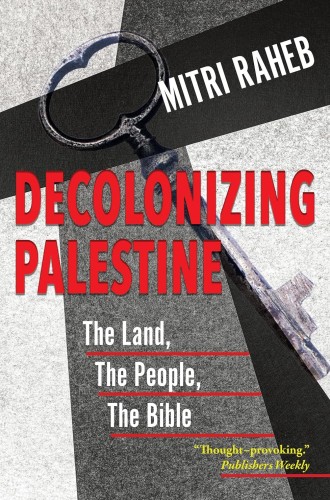Mitri Raheb takes on Christian Zionists (even the liberal ones)
The Palestinian theologian challenges Christians to examine their feelings about Israel—and to ask what their faith has to do with these feelings.

Decolonizing Palestine
The Land, the People, the Bible
Last fall, several weeks into Israel’s bombardment of Gaza, I participated in an interfaith press conference calling for a cease-fire. After the event, one of the organizers, a longtime Jewish peace activist, thanked me for coming and shared that as the weeks went on, she’d been asking herself with growing anger, “Where are the White Christians?” She observed that the White Christian clergy she’d grown accustomed to seeing at interfaith gatherings for peace and justice had grown strangely silent after October 7. Our absence, she said, was conspicuous.
Historically, White mainline Protestants have not hesitated to engage moments like these. For the past century, often in the pages of this magazine, they have publicly disputed questions related to Judaism, Zionism, and the state of Israel. They have argued about whether the United States should enter World War II and whether it should open its borders to Jewish refugees fleeing Europe, whether Christians should support the creation of a Jewish state in Palestinian lands, whether Israel should be criticized for the displacement and suffering of Palestinians, and whether political anti-Zionism is inherently antisemitic. These conversations reveal a wide spectrum of positions, particularly before the late 1960s, when US public opinion firmly settled in favor of Israel. All together, they communicate a common investment on the part of mainline Protestants in the fate of the Holy Land, its people, and its relationship to our lives together here in the United States.
In Decolonizing Palestine, Palestinian Lutheran pastor and theologian Mitri Raheb draws a bold line connecting the settler colonialism of Western Christendom with the application of Zionism in Israel and the Palestinian territories. Unlike “classical” colonialism, which establishes colonies primarily to extract wealth, settler colonialism systematically dispossesses Indigenous peoples of their lands and resources in order to establish a new society. To this end, it employs political, legal, and ideological strategies that portray settlers as rightful inhabitants of the land and Indigenous peoples as extraneous. Indigenous resistance to this project of elimination is held up as evidence that native populations represent an imminent threat to the state’s security and must be aggressively subdued.




